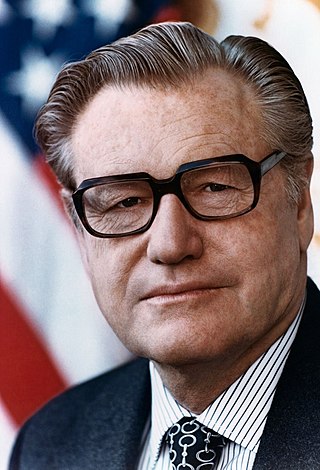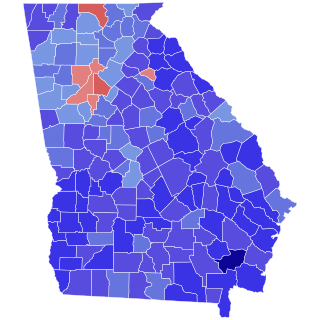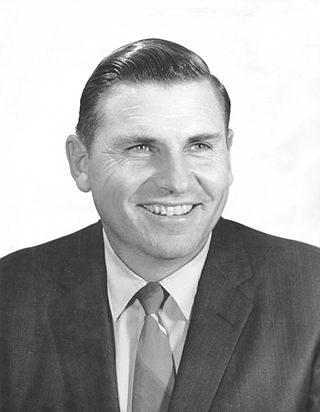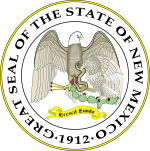
The 1964 United States presidential election was the 45th quadrennial presidential election. It was held on Tuesday, November 3, 1964. Incumbent Democratic President Lyndon B. Johnson defeated Republican Senator Barry Goldwater in a landslide victory. Johnson was the fourth and most recent vice president to succeed the presidency following the death of his predecessor and win a full term in his own right. Johnson won the largest share of the popular vote for the Democratic Party in history, 61.1%, and the highest for any candidate since the advent of widespread popular elections in 1824.

The Rockefeller Republicans were members of the United States Republican Party (GOP) in the 1930s–1970s who held moderate-to-liberal views on domestic issues, similar to those of Nelson Rockefeller, Governor of New York (1959–1973) and Vice President of the U.S. (1974–1977). Rockefeller Republicans were most common in the Northeast and the industrial Midwestern states, while they were rare in the South and the West.

The 1996 United States Senate elections were held on November 5, with the 33 seats of Class 2 contested in regular elections. Special elections were also held to fill vacancies. They coincided with the presidential election of the same year, in which Democrat Bill Clinton was re-elected president.

The 1982 United States Senate elections were held on November 2, 1982. They were elections for the United States Senate following Republican gains in 1980. The 33 Senate seats of Class 1 were up for election in 1982. A total of four seats changed hands between parties, with Democrats winning seats in New Jersey and New Mexico, and Republicans taking seats in Nevada and the seat of the lone independent, Senator Harry Byrd Jr., in Virginia. Democrats made a net gain of one seat bringing them to 46 seats, while Republicans stayed at 54 seats for a majority. However, the Democratic gain in New Jersey replaced a Republican that had been appointed earlier in the year. Liberal Republicans senators in Connecticut, Rhode Island and Vermont held onto their seats, keeping the Senate in Republican hands.

The 1978 United States Senate elections were held on November 7, in the middle of Democratic President Jimmy Carter's term. The 33 seats of Class 2 were contested in regular elections. Special elections were also held to fill vacancies.

The 1968 United States Senate elections were elections for the United States Senate. Held on November 5, the 34 seats of Class 3 were contested in regular elections. They coincided with the presidential election of the same year. The Republicans picked up five net seats in the Senate. This saw Republicans win a Senate seat in Florida for the first time since Reconstruction.

The 1954 United States Senate elections was a midterm election in the first term of Dwight D. Eisenhower's presidency. The 32 Senate seats of Class 2 were contested in regular elections, and six special elections were held to fill vacancies. Eisenhower's Republican party lost a net of two seats to the Democratic opposition. This small change was just enough to give Democrats control of the chamber with the support of an Independent who agreed to caucus with them; he later officially joined the party in April 1955.
Jack Daniels was a Democratic New Mexico state representative. He ran unsuccessfully for the governorship in 1970, and for the United States Senate in 1972.
The Alabama Democratic Party is the affiliate of the Democratic Party in the state of Alabama. It is chaired by Randy Kelley.

The 1998 Alaska gubernatorial general election took place on November 3, 1998. The election resulted in a landslide for the Democratic incumbent, Tony Knowles, who had won the 1994 gubernatorial election by only 536 votes. Jim Sykes, founder of the Green Party of Alaska, ran on that party's ticket, but Desa Jacobsson later replaced him on the ballot.

The 1954 South Carolina United States Senate election was held on November 2, 1954. Senator Burnet R. Maybank did not face a primary challenge in the summer and was therefore renominated as the Democratic nominee for the election in the fall. However, his death on September 1 left the Democratic Party without a nominee, and the executive committee nominated state Senator Edgar A. Brown as their replacement candidate. Many South Carolinians were outraged by the party's decision to forgo a primary election, and former Governor Strom Thurmond entered the race as a write-in candidate. He easily won the election and became the first U.S. senator to be elected by a write-in vote in an election where other candidates had ballot access. A Senate election where the victor won by a write-in campaign did not happen again until 2010.

The 1970 Georgia gubernatorial election was held on November 3, 1970. It was marked by the election as Governor of Georgia of the relatively little-known former state senator Jimmy Carter after a hard battle in the Democratic primary. This election is famous because Carter, who was often regarded as one of the New South Governors, later ran for president in 1976 on his gubernatorial record and won. As of 2024, this was the last time Fulton County was carried by the Republican candidate in a gubernatorial election, the only time it failed to back Carter, and the last time a Democrat in any race won without carrying it. It is also the last time that Clarke County voted for the Republican candidate for governor.

The 1966 Arkansas gubernatorial election was held on November 8, 1966. Winthrop Rockefeller was elected governor of Arkansas, becoming the first Republican to be elected to the office since Reconstruction in 1872.
Since the Great Depression, Rhode Island politics have been dominated by the Rhode Island Democratic Party, and the state is considered part of the Democrats' "Blue Wall." Democrats have won all but four presidential elections since 1928, with the exceptions being 1952, 1956, 1972, and 1984. The Rhode Island Republican Party, although virtually non-existent in the Rhode Island General Assembly, has remained competitive in gubernatorial elections, having won one as recently as 2006. Until 2014, Democrats had not won a gubernatorial election in the state since 1992, and it was not until 2018 that they won one by double digits. The Rhode Island General Assembly has continuously been under Democratic control since 1959.

The 1994 New Mexico gubernatorial election was held on November 8, 1994, for the four-year term beginning on January 1, 1995. Candidates for governor and lieutenant governor ran on a ticket as running mates.

The 1990 New Mexico gubernatorial election took place on November 6, 1990, in order to elect the Governor of New Mexico. Due to term limits, incumbent Republican Garrey Carruthers was ineligible to seek a second term as governor. Democrat Bruce King won his third and final term overall as governor, defeating Republican Frank Bond. King won the largest share of the vote out of his four gubernatorial campaigns. This is the most recent election in which Catron County has voted for a Democratic gubernatorial candidate.

The 1974 New Mexico gubernatorial election took place on November 5, 1974, in order to elect the Governor of New Mexico. Due to term limits, incumbent Democrat Bruce King was ineligible to seek a second term as governor. Democrat Jerry Apodaca narrowly defeated Republican Joe Skeen. This election saw Hidalgo County vote for a Republican gubernatorial candidate for the first time ever.

The 1966 New Mexico gubernatorial election took place on November 8, 1966, in order to elect the Governor of New Mexico. Due to term limits, incumbent Democrat Jack M. Campbell could not run for reelection to a third term. Republican David Cargo defeated Democrat Gene Lusk in a close race.

The 1964 New Mexico gubernatorial election took place on November 3, 1964, in order to elect the Governor of New Mexico. Incumbent Democrat Jack M. Campbell ran for reelection to a second term against Republican Merle H. Tucker. Campbell defeated Tucker in a landslide, receiving the largest share of the vote by any New Mexico gubernatorial candidate to that point. Campbell's 60.21% vote share remained the largest ever in the state's history until 2006 when Bill Richardson received 68.82% of the vote. Richardson's 2006 landslide is also the only time since this election that Chaves County and San Juan County have voted for a Democratic gubernatorial candidate and Los Alamos County also did not vote Democratic again until 2006.

The 1960 New Mexico gubernatorial election took place on November 8, 1960, in order to elect the governor of New Mexico. Incumbent Democrat John Burroughs ran for reelection to a second term against his predecessor Republican Edwin L. Mechem in a rematch of the very close 1958 election. This time, Mechem narrowly defeated Burroughs by an even smaller margin than was seen in the previous election. This is the most recent gubernatorial election in which a Republican candidate won Santa Fe County.





















